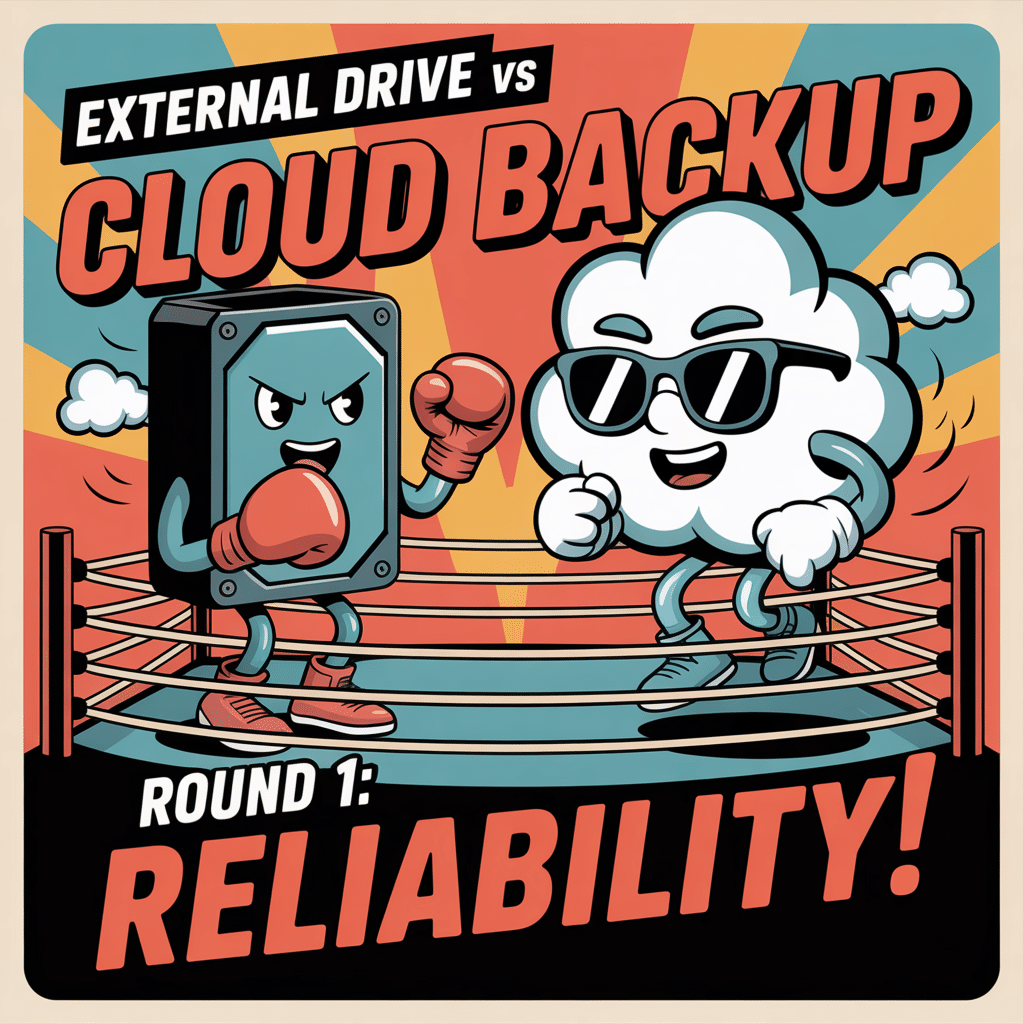💡 DIY Computer Fixes?
Grab my easy step-by-step guide and keep your computer running like new.
External Drive vs Cloud Backup: What’s Best for You? External Drive vs Cloud Backup: What’s Best for You?

When it comes to keeping your files safe, there are two main camps — those who swear by external hard drives, and those who’ve fully embraced the cloud. Both can protect your precious photos, documents, and memories, but each has its own strengths and weaknesses. Let’s break it down in plain English — no geek speak required.
🖴 External Drives: The Old Reliable
The Pros
-
No Internet Needed: You can back up or restore files anytime, even without Wi-Fi.
-
One-Time Purchase: Buy it once and it’s yours. No monthly fees or subscriptions.
-
Fast Transfers: Large files (like videos or photos) copy quickly — great for people with slower internet connections.
-
Privacy Control: Your data stays in your hands — literally. No third-party servers involved.
The Cons
-
Can Fail or Break: Hard drives don’t last forever. A drop, spill, or electrical surge can wipe out everything.
-
Easy to Forget: Many people buy a backup drive, use it once, and forget to plug it in again.
-
Not Off-Site: If your home has a fire, flood, or theft, the drive can go with it — and so can your data.
-
Limited Capacity: Eventually, you’ll fill it up and need to buy another one.
☁️ Cloud Backup: The Set-It-and-Forget-It Option
The Pros
-
Automatic Backups: Once it’s set up, it quietly backs up your files in the background — no reminders needed.
-
Accessible Anywhere: Log in from any device to recover or view your files. Great for travelers or snowbirds.
-
Off-Site Protection: Your data is stored in secure data centers, safe from local disasters.
-
Version History: Many cloud services let you recover older versions of files — a lifesaver if you accidentally overwrite or delete something.
The Cons
-
Monthly or Yearly Fees: The convenience comes with a price tag — usually $5–$10 a month for individuals.
-
Internet Dependence: Backups and restores can be slow if your internet connection isn’t great.
-
Privacy Concerns: Your data lives on someone else’s servers. While encryption helps, some people just prefer keeping things local.
-
Storage Limits: Free plans don’t go far. Videos and photos can eat up cloud space fast.
💡 Real-World Advice: The Best of Both Worlds
If you really want peace of mind, use both. Here’s how most tech pros (including me) handle it:
-
Local Backup – Use an external drive for quick access and fast recovery.
-
Cloud Backup – Use a cloud service as a safety net for disasters or device loss.
That way, if one fails — and sooner or later, one will — you’ve still got a copy somewhere safe. Think of it like wearing both a seatbelt and having an airbag.
🧭 Choosing What’s Right for You
| Your Situation | Recommended Backup Plan |
|---|---|
| Slow or unreliable internet | External drive |
| You move between devices often | Cloud backup |
| You want to “set it and forget it” | Cloud backup |
| You’re on a tight budget | External drive |
| You want the safest option possible | Both! |
⚙️ My Take
If you only have the budget or patience for one option, go cloud. It’s automatic, off-site, and doesn’t rely on you remembering to plug anything in.
But if you’re serious about protecting your data — or if you’ve ever lost family photos or tax records before — the hybrid approach is the smartest move.
External drives and the cloud don’t have to compete. They can be teammates in keeping your digital life safe.
More information
How to Choose an External Hard Drive – PCMag
A reliable, frequently updated guide to the best drives for backups and storage.
Seagate’s Backup Basics – Seagate Blog
A clear overview from one of the biggest drive manufacturers.
Backblaze Blog: What Is Cloud Backup?
Excellent, non-salesy explanation of how cloud backup works and why it matters.
IDrive vs Google Drive vs Dropbox Comparison – Tom’s Guide
Comprehensive, updated comparison of leading cloud backup services.
National Cybersecurity Alliance – Backup Your Data Tips
Nonprofit, trustworthy source with practical data protection advice.
Microsoft: How to Back Up Your PC
Step-by-step help from Microsoft for Windows users.


